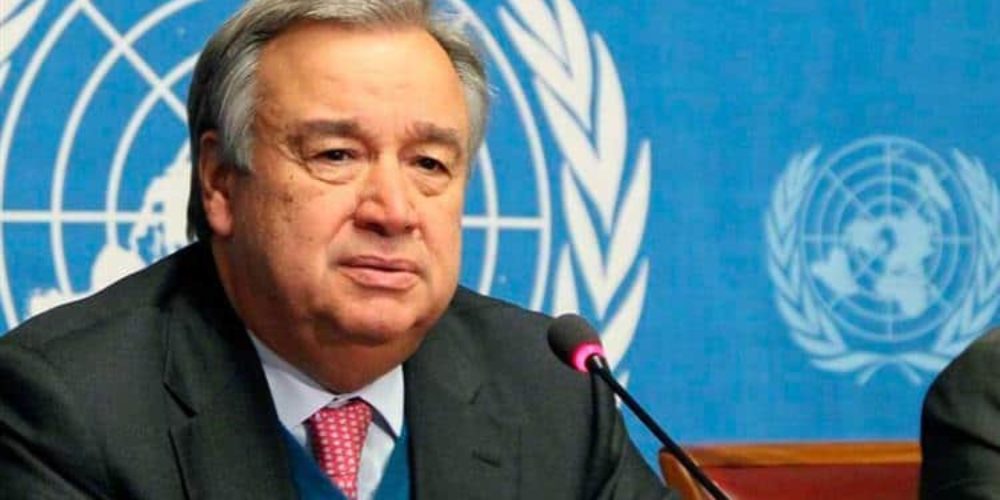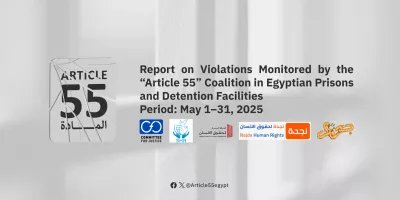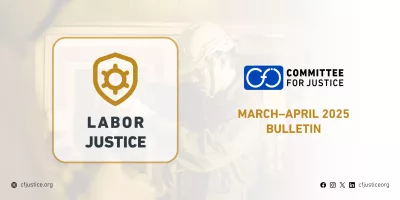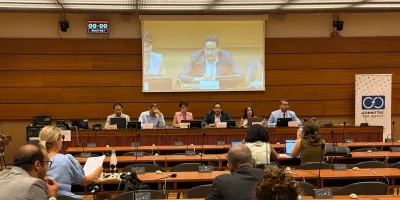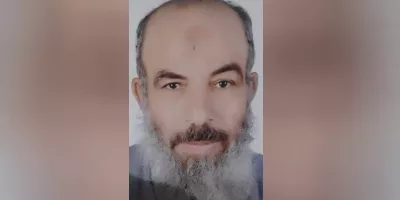The Committee for Justice (CFJ) said that it welcomes the report of the United Nations Secretary-General, António Guterres, on the acts of intimidation and reprisals against human rights defenders cooperating with the UN, which is considered a glimmer of hope amid the severe darkness suffered by human rights defenders in the Middle East and North Africa.
In his report submitted to the Human Rights Council, Guterres expressed his concern over continued reports of intimidation and reprisals against individuals and groups seeking to cooperate, or who have cooperated, with the United Nations, its representatives and mechanisms in the field of human rights.
Commenting on the report, CFJ Executive Director Ahmed Mefreh said:
“The report is seen as a glimmer of hope amid the severe darkness suffered by human rights defenders in the Middle East and North Africa, and it is a commendable effort by the United Nations that guarantees, to some extent, a degree of protection for human rights defenders cooperating with the organization.”
The 79-page report included a compilation and analysis of available information, from all appropriate sources, on alleged reprisals and recommendations on how to address the issue, and the responses the UN received from the governments of some countries regarding acts that occurred on their soil, during the period from June 1, 2019, to April 30, 2020, as well as a follow-up to cases mentioned in previous reports.
The report contained incidents of reprisals against human rights defenders who cooperated with the United Nations in about 40 countries, as well as a follow-up to cases mentioned in previous reports in more than 30 countries.
The report also documented retaliatory incidents against human rights defenders in Algeria, Bahrain, Egypt, Israel, Occupied Palestine, Kuwait, Libya, Morocco, Saudi Arabia, South Sudan, Turkey, and Yemen.
“The report listed and followed-up cases in several countries covered by our association, and some of them were based on complaints filed by the CFJ itself, one of which was a follow-up of my own, after I was subjected to harassment and threats by the representative of the Egyptian National Council for Human Rights on an Egyptian website in 2019, following my participation in the comprehensive review of Egypt at the Human Rights Council,’’ Mefreh added.
The report mentioned cases in some countries covered by the CFJ, including:
Egypt:
The case of human rights lawyer Mohamed El-Baqer, who was arrested for his engagement with the UN in the context of the November 2019 Universal Periodic Review (UPR) of Egypt.
The report also addressed the case of Egyptian human rights defender, Ramy Kamel Saied Salib, of the Maspero Youth Foundation in Cairo, as well as harassment and intimidation of human rights defenders Ms. Salma Ashraf Abdel Halim Abdelghaffar, of Human Rights Monitor, and Mr. Mohamed Zarea, of Arab Penal Reform Organization, following their engagement with the Human Rights Council in March 2019, and the situation of Amr Magdi, of Human Rights Watch, who was subject to a smear campaign by a prominent television presenter who called for his execution following the release of a May 2019 report on alleged human rights violations committed by Egyptian Security Forces and Daesh-affiliates in North Sinai.
The report also followed up on the situation of Bahey El Din Hassan, of the Cairo Institute for Human Rights Studies, which was included in the 2019 report of the Secretary-General on allegations of criminal charges, travel ban and assets freeze for his cooperation with the UN. According to the report, Hassan reportedly continues to face attacks, harassment and death threats resulting from his sustained engagement with the UN.
The report also documented developments in the case of the executive director of CFJ, Ahmed Mefreh, which was included in the 2014 report of the Secretary-General, and then in 2019 when he engaged in the 2019 UPR of Egypt. On 14 November 2019 a representative of the Egyptian National Council for Human Rights, who participated in the UPR of Egypt, accused Mr. Mefreh, on an internet-based news website ‘Cairo24’, of being present at the UN as part of the “Muslim Brotherhood’s delegation aimed to disrupt the UPR of Egypt.” On 15 November 2019, identical content was published by at least six online news outlets.
The report also followed up on the case of Ibrahim Abdelmonem Metwally Hegazy of the Association of the Families of the Disappeared that was included in the 2019 and 2018 reports of the Secretary-general, raising concern about the continued detention of Metwally, which they stated was “in apparent contradiction with the Cairo Criminal Court’s acquittal verdict” in October 2019.
The report also referred to the case of Dr. Ahmed Shawky Abdelsattar Mohamed Amasha, which was included in the 2017, 2018, and 2019 reports of the Secretary-General, in 2019, he was released on bail and required to report to the police station twice a week. In June 2020, It was subsequently reported to OHCHR that Amasha was arrested by police officers and his fate and whereabouts remained unknown.
Saudi Arabia:
The report discussed the arbitrary detention of Abdulaziz Youssef Mohamed al-Shubaili, of the Saudi Civil and Political Rights Association, and expressed concern about reprisals against him for reporting to the United Nations.
The second annex of the report contained new developments in the situations of Loujain Al-Hathloul, Samar Badawi, Abdullah Al Hamid, Mohammad Fahad Al Qahtani, Yahya Al-Assiri, Essa Al Nukheifi, Issa Hamid Al-Hamid, and Fawzan Mohsen Awad Al Harbi and his wife Amal Al Harbi.
South Sudan:
The report quoted the United Nations Mission in South Sudan (UNMISS) reporting that six individuals and organizations were allegedly threatened, arbitrarily arrested, detained and ill-treated for their cooperation, or perceived cooperation, with the United Nations. Names and details of those concerned are withheld for fear of further reprisals.
Kuwait:
The report mentioned the Kuwaiti government’s response to the allegations that Maria Lazareva, a Russian Federation and Vice-Chairperson and Chief Executive Officer of KGL Investment Company (KGLI), and her legal team were threatened.
The Kuwaiti government confirmed that Lazareva is currently not in custody and that her case is still under consideration, noting that the press release issued by the Kuwait Port Authority, which was issued in response to those of the legal team, did not include any threats and was a reaction to statements and defamatory campaigns aiming to challenge the judicial system and to intimidate and obstruct the course of justice.
Libya:
During the reporting period, OHCHR received multiple allegations of reprisals against human rights defenders and journalists from Libya, including for their engagement with the UN. Names and details of those affected cannot be provided for fear of further reprisals
Morocco:
The report mentioned the fact that the OHCHR was informed that Aminatou Haidar of the “Collectif des défenseurs sahraouis des droits de l’homme”, was subjected to threats and physical attacks on January 11, 2020, by police officers on her way to a meeting. It was reported that the officers verbally insulted her and her children, and physically assaulted her. While she was physically attacked, one officer allegedly made a reference to her complaining to the UN
Occupied Palestinian Territories:
The report monitored that in November and December 2019, several Palestinian and international women’s organizations and activists were subject to intimidation and threats for their support for the Convention on the Elimination of Discrimination against Women (CEDAW), and actual or perceived engagement with CEDAW’s Committee.
Israel:
The report noted that on November 8, 2019, special procedures mandate holders criticized a decision by the Israeli Supreme Court upholding the government’s decision to revoke the work visa of Omar Shakir, of Human Rights Watch. The order was based on allegations that Shakir would support a boycott of Israel, including alleged statements by Shakir in support of a database produced by the UN on businesses that operate in Israeli settlements.
Algeria:
On 16 April 2020, special procedures mandate holders expressed concern at allegations of attacks against the privacy and personal dignity of Olaya Saadi following her efforts to advocate for the release of her husband with the UN.
Based on the above, CFJ calls on all countries of the world to declare their absolute support for everyone’s right to have unimpeded access to international bodies and to communicate with them, without being subjected to any harassment or threats; that may limit the activity of human rights defenders anywhere in the world.
CFJ also calls for the opening of immediate, independent, and transparent investigations and facilitating remedies for victims in the facts mentioned in the report and previous reports, as an important step to ensure that states fully respect the rights of victims, their views, and provide appropriate protection and empowerment measures for them.

